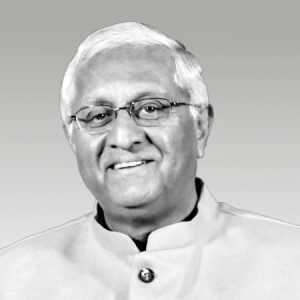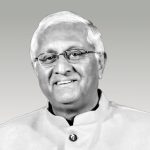
R Gopalakrishnan
Guest is known for...
R Gopalakrishnan is a Board Member, author, advisor, speaker, and teacher who has had an illustrious career in Hindustan Lever and Tata Sons. He has authored 12 books since 2007 and spends his time on Boards, as a Mentor and Corporate Advisor, and as a speaker and Teacher. He is an Executive in Residence at SP Jain and a Distinguished Professor at IIT Kharagpur.
Here's what I will learn...
The conversation with R Gopalakrishnan centers around his book, “Crash,” where he examines 15 high-profile CEO appointments that did not work out. He identifies common patterns across these transitions, which are discussed in the interview. The conversation begins with Gopal’s career journey and thoughts on having a long career, followed by an analysis of his book. The interview concludes with a rapid-fire Q&A session on the leaders and books that have influenced Gopal.
LISTEN TO THE FULL CONVERSATION
From the Podcast
RG speaks about how he has thought about his career like a marathoner. He speaks about all of us having to refire rather than retire. He uses the metaphor of Lego to state that each one of us like a Lego piece with its unique characteristics and we are looking for a hole in the sky where we could fit in. And he suggests that we keep looking (as Steve Jobs would say) till find a snug fit and we find ourselves in flow.
RG speaks about his experiences from having made around 200 odd CEO appointments in his years as a mentor and as a Board Member. He goes onto say that his hit-rate might only be around 50-60% over the years. He shares some principles around how we can build robustness in hiring decisions and how we can think about experience, competency and potential as we evaluate different types of candidates.
RG speaks about how transitioning from one context to another is a bit like moving from driving a race car to rock climbing. You need to feel the surface before you transfer your weight and move forward. He speaks about the criticality of adopting (not appointing) mentors around you. These informal mentors often act as a feedback loop for the leader to course correct ensuring that hairline cracks becoming fractures.
RG speaks about the fact that CEOs are measured not just on the objective performance metrics that have been laid out but also on how they perform with respect to the expectations of the pecking order of stakeholders in the system. The challenge is that the former is often laid out clearly (if one is lucky) and the latter is a fuzzy truth that leaders need to discern with finesse.
Gopal speaks about the criticality of focusing on not just efficiency (linearly moving from point A to point B) but effectiveness (moving according to the lay of the land much like how water comes down a mountain). He shares some metaphors and discusses how sometimes CEOs might end up gravitiating towards efficiency while the Board might be seeking effectiveness.
RG speaks about the criticality having a healthy friendly relationship with the Board. He speaks about the narrative that CEOs often have around Board members being another “layer to manage”. He suggests that if we instead treat them as founts of wisdom and as mentors, there is a lot of value that CEOs can unlock from the Board members.
RG speaks about the criticality of seeking and absorbing the feedback from the people around you. He speaks about the role of a spouse who observes us in high resolution and says that they (or close friends or a trusted colleague or a board member) could act as a concave psychological mirror. He speaks about the story of Clementine Churchill ( wife of Winston Churchill ) whose “feedback letter” to her husband is kept in a museum in London.
RG speaks about the role of the leader bringing in adequate openness and a prototyping mindset to the way he or she sculpts his or her ideas. If he or she has the habit of “baking it too much” in his or her mind and then present to the others as a sales pitch it might be bad for business and for the leader’s trust quotient with the ecosystem around.
RG speaks about how leaders coming in from one context can effectively adapt to a completely new context especially when they do not have a working knowledge of the new space. He underscores the importance of humility, openness to learning to build trust and come up the learning curve in the new environment.
